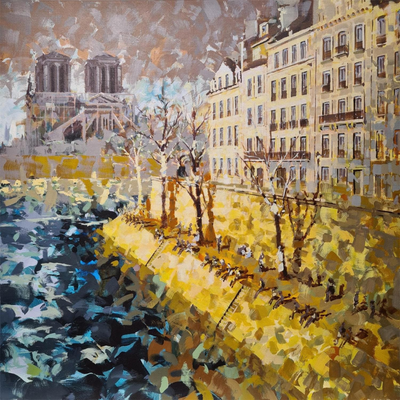🎁 SCREEN PRINTING : Free for all orders over €500 🎁
Free delivery to gallery - Returns extended from 19.11 to 19.01


Acrylic paintings
Filter
(392 Artworks)
No matches for the requested criteria.
Discover our favorites
More than 30 000 artworks in all styles
More than 30 000 artworks in all styles
Buy an acrylic painting Carré d'artistes
Acrylic painting for sale
Explore the world of contemporary acrylic painting and discover unique paintings by our talented artists. Acrylic paint is highly favored by modern artists for its distinct characteristics, including its smooth, plastic-like texture, quick drying time, and versatile application.
Browse our collection of original acrylic art for sale. Whether you prefer abstract, figurative, landscapes or portraits, you’re sure to find a unique painting that speaks to you.
Read more
Acrylic paint: a contemporary art form
Acrylic painting, a more recent technique inspired by oil painting, began to emerge in the 1930s in the United States.
Acrylic’s popularity grew rapidly, aligning well with the evolving modern world.

By the 1950s, the availability of acrylics in tubes and jars helped democratize this art form. With its water-soluble nature, acrylics offered practicality, appealing to pop artists and others.
Influential artists like Andy Warhol brought this technique to new heights, and notable abstract expressionists such as Mark Rothko, Robert Motherwell, and Helen Frankenthaler adopted acrylic as a preferred medium.
How is acrylic on canvas made?
Contemporary acrylic art diverges from traditional oil painting methods. It can be thinned to achieve a more fluid consistency, enabling artists to experiment with transparency and refine the raw texture of color pigments.
Unlike oil paint, which can take days or even weeks to dry, acrylics dry quickly, making them more convenient for many artists. While some continue to use oil, many now favor acrylic on canvas for its speed and flexibility.
Unique characteristics of acrylic paint
Acrylic paint offers several unique qualities, including:
- Permanence once applied
- Lightweight and easy to handle
- Resistance to humidity and water once dry
- Washability
- Long-lasting color vibrancy that resists dulling
- Versatility on various surfaces
- Applicability with a wide range of tools, such as brushes, palette knives, rollers, or even hands
- Ability to create diverse textures and effects on the canvas
Contemporary artists can also add mediums to adjust the paint’s viscosity, allowing them to achieve various styles, from abstract to realism.
With these qualities, contemporary acrylic painting is ideal for any room or decor style, even adding a fresh, modern touch to bathrooms. Each original painting available on Carré d’artistes tells its own story, reflecting the artist’s emotions and experiences.
Explore Medeya Lemdiya’s pop art interpretations of iconic figures or immerse yourself in the abstract world of Bjerke.
Types of acrylic paintings
Acrylic paintings allow for creative expression and can complement any decor style. Some popular types of acrylic paintings include:
Abstract paintings: Featuring bright colors and abstract shapes, this style focuses on emotion and sensory experience, free from realistic representation.
Portraits: Depicting people or animals, often with realistic detail, capturing the essence of the subject.
Landscapes: Showcasing natural scenes with elements like trees, mountains, or bodies of water, bringing the beauty of nature indoors.
Still life: Depicting objects such as flowers, fruits, and other items, arranged artistically to capture their beauty and detail.
Acrylic artworks on wood are also popular, providing a durable and stylish option for any home. Easy to clean and resistant to temperature changes, these pieces work well in any room.
What type of acrylic painting would you like to feature in your space? Browse our collection of acrylic paintings for sale and find the perfect piece for your walls.
Paintings by technique


2.jpg)



